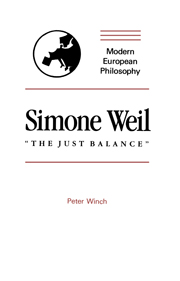Book contents
- Frontmatter
- Contents
- Acknowledgements
- 1 Introduction
- 2 The Cartesian background
- 3 The sensations of the present moment
- 4 “La simple perception de la nature est une sorte de danse”
- 5 Language
- 6 Necessity
- 7 Equilibrium
- 8 “Completely free action”
- 9 The power to refuse
- 10 “The void”
- 11 Geometry
- 12 Incommensurability
- 13 Beauty
- 14 Justice
- 15 “A supernatural virtue”?
- Notes
- Bibliography
- Index
8 - “Completely free action”
Published online by Cambridge University Press: 05 February 2010
- Frontmatter
- Contents
- Acknowledgements
- 1 Introduction
- 2 The Cartesian background
- 3 The sensations of the present moment
- 4 “La simple perception de la nature est une sorte de danse”
- 5 Language
- 6 Necessity
- 7 Equilibrium
- 8 “Completely free action”
- 9 The power to refuse
- 10 “The void”
- 11 Geometry
- 12 Incommensurability
- 13 Beauty
- 14 Justice
- 15 “A supernatural virtue”?
- Notes
- Bibliography
- Index
Summary
The obstacles to a genuine “equilibrium” between human beings seem to lie in the very nature of the human condition as pictured in “Reflections Concerning the Causes of Liberty and Social Oppression,” the centrepiece of Oppression and Liberty. That condition is characterized as a living together of beings whose most essential feature is activity. The argument is that the moment such beings become mutually dependent, as they do when their attempts to assert their active natures in the face of a hostile nature lead to a division of labour, the active independence of some, and perhaps of all, is inevitably threatened. Because such active independence is essential to human nature, this state of affairs is not a true equilibrium. The problem, therefore, is to work out what form of association could possibly constitute such an equilibrium. Needless to say, the form of the problem's solution will be determined by the considerations which first generated the problem.
Those considerations arise out of the way Simone Weil conceives activity. I have already discussed at some length the problems which this concept created in “Science et perception dans Descartes” and the way in which she tried to deal with those problems in Lectures on Philosophy. “Reflections Concerning the Causes of Liberty and Social Oppression” shows that the concept is still causing her serious difficulties. The difficulties are of two sorts. Some of them are due to her not having completely worked through and taken to heart the main line of thinking in Lectures. Some of them are due to deficiencies still involved in that line of thinking itself.
- Type
- Chapter
- Information
- Simone Weil: "The Just Balance" , pp. 90 - 101Publisher: Cambridge University PressPrint publication year: 1989



